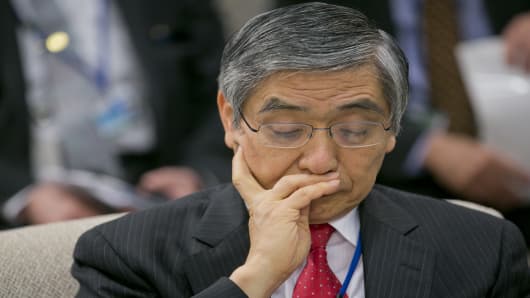A slew of economic data out of Japan on Tuesday gives conflicting signals on whether Prime Minister Shinzo Abe's radical revival plan is working or not.
While household spending surged 5.2 percent in March over last year and the unemployment rate also dropped to 4.1 percent, below forecasts of 4.3 percent, retail sales disappointed, marking a 0.3 percent decline against expectations of a 0.6 percent rise. Industrial output also posted a meager rise of 0.2 percent in March over the previous month.
This disparity between the different data shows just how far Japan's economy still has to go, said analysts.
"What the discrepancy shows is that we are starting from a very weak base in the Japanese economy," said Manpreet Gill, senior investment strategist at Standard Chartered Bank, on CNBC's "The Call" on Tuesday.
(Watch This: Japan Consumers Are Benefiting From Abenomics )
"While there are sparks of positivity in there, the fact is, more broadly the economy remains very, very weak. While we are coming off a fairly low point we do have a very long way to go and policymakers seem to acknowledge that," he added.
Since he came to power late last year Prime Minister Shinzo Abe has engineered a turnaround in Japanese investor sentiment. His pledge to revive the Japanese economy and end deflation has led to a big stock rally over the past few months and pushed the yen lower, close to the 100-level against the U.S. dollar.
The Bank of Japan on its part announced in early April that it would pump $1.4 trillion into the economy in pursuit of a 2 percent inflation target.
(Read More: 'Abenomics' Effects Showing Up in Household Spend )
According to Gill, the pivotal component that will help Japan reach its inflation target will be wage hikes.
"Wage inflation is one of the critical components that the Bank of Japan is looking to get right to achieve its inflation target," he said.




